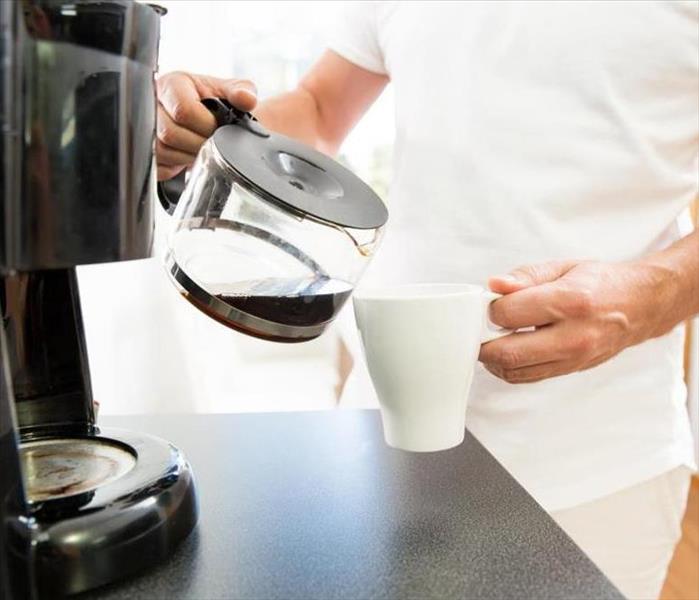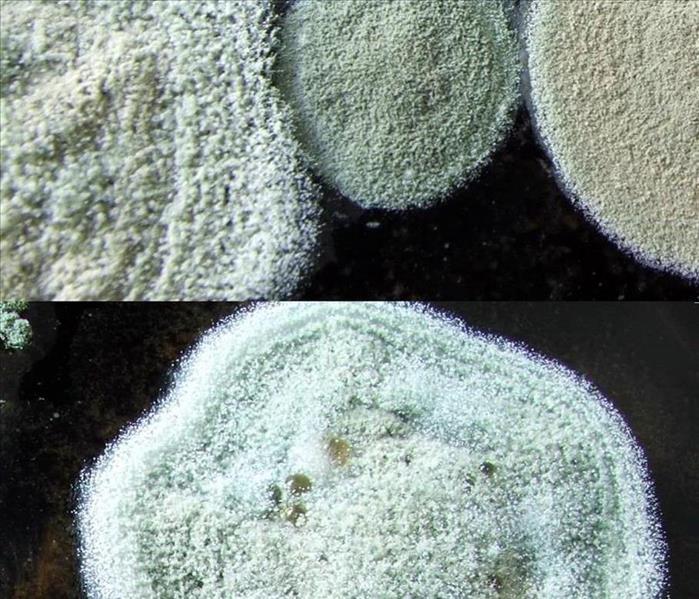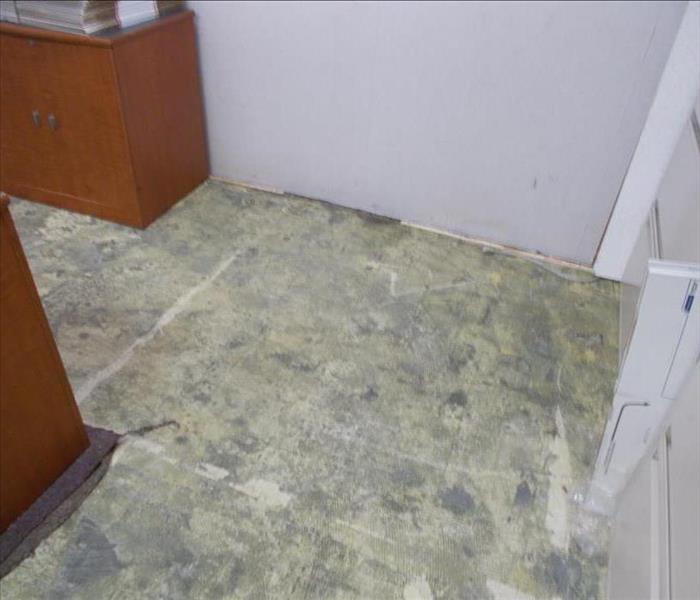Recent Mold Remediation Posts
Correctly Cleaning Coffee Pots
8/27/2021 (Permalink)
 Correctly Cleaning Coffee Pots
Correctly Cleaning Coffee Pots
Everyone loves a good cup of coffee (yes, even the stuff made in the office), but would they love it so much if they knew what was growing in the pot? Coffee pots are constantly full of water, and chances are they are not properly cleaned at the end of each day.
The result is generally hidden mold growth that infects every cup of coffee poured. If you want your employees or customers to stay healthy and happy, keep your coffee pots clean. As a bonus for your efforts, your coffee will taste better (and it won’t have that moldy smell anymore either). How To Clean Your Coffee Pot Cleaning your coffee pot is simple and shouldn’t take you more than a few minutes each week. Use these six steps, provided by SERVPRO of Morgantown mold remediation team, to prevent mold growth in your coffee pot and chamber:
1. Make a solution that is equal parts water and vinegar. Pour this in your coffeemaker’s water chamber.
2. Set your pot to brew. Allow it to do its job as normal until the water chamber is half empty
3. Turn off the machine and let it sit for half an hour, then resume brewing.
4. Rinse the machine thoroughly, then put in a new filter. Fill the water chamber with just water. Allow it to run through the brewing cycle twice.
5. Fill the carafe with warm water, some soap and a small amount of either rice or sugar, both of which serve as a gentle abrasive. Twirl the combination around in the pot, and use a sponge to remove any excess buildup. Rinse and dry thoroughly.
6. Wipe down the outside of your coffeemaker with a damp cloth.
While steps one through four should be done weekly, steps five and six should be done at the end of each day. By spending an hour each week cleaning your coffee pots, you can prevent mold growth and keep your employees/ customers happy and healthy.
Tracie "Dusty" Nichols
304-291-3434
Five Factors That Affect the Cost of Mold Removal
3/29/2021 (Permalink)
 Different types of mold that can be found in your home.
Different types of mold that can be found in your home.
Five Factors That Affect the Cost of Mold Removal:
The cost of professional mold removal services for your home in Morgantown, can average anywhere from $500 to $6,000, with some infestations costing much more. Here are five factors that will affect the overall price:
1. Size of the Mold Problem While you might be able to save money by tackling very small mold problems on your own, you will need the help of a mold remediation specialist for larger problems. Generally, the more widespread the problem is, the higher the cost.
2. Expense of Added Mold Testing If you want a better idea of the levels of mold in your home and what species of mold is present, you can request a mold test at an added expense. A specialist should be able to address any type of mold growth that is found, including performing black mold removal.
3. Location of the Mold If the mold in your home is easy to access, such as on the surface of the wall or floor, you can expect to pay less for mold removal. However, if mold is dwelling deep inside your walls or somewhere else that is hard to access or requires demolition, the price will rise.
4. Source of the Problem What caused the mold to grow in the first place? If your mold problem was caused by a large underlying issue, such a leaking roof, you will also need to consider the cost of addressing this issue.
5. Cost of Required Restoration If mold gets into the structure of your home, infects your carpet, or damages your belongings, the remediation specialist will complete the mold cleanup process and then fix any damage that has been caused. From replacing your carpet to completely rebuilding walls, these costs will certainly build up.
Dealing with mold removal can be costly, but it is a necessary process. As you prepare to call in a mold remediation specialist, estimate what you can expect to pay by considering these five factors.
Tracie "Dusty" Nichols
304-291-3434
Mold Prevention Tips
9/10/2018 (Permalink)
Mold Prevention Tips
- Keep humidity levels as low as you can - no higher than 50% - all day long. An air conditioner or dehumidifier will help you keep the level low. Keep in mind the humidity levels change over the course of a day with changes in the moisture in the air and the air temperature, so you will need to check the humidity levels more than once a day.
- Be sure your home has enough ventilation.Use exhaust fans which vent outside your home in the kitchen and bathroom.
- Fix any leaks in your home's roof, walls, or plumbing.
- Clean up and dry out your home thoroughly and quickly (within 24-48 hours) after flooding.
- Remove or replace carpets and upholstery that have been soaked and cannot be dried promptly.
Mold and Your Health
9/10/2018 (Permalink)
There is always some mold everywhere - in the air and on many surfaces. Molds have been o the Earth for millions of years. Mold grows where there is moisture.
Mold and Your Health
Exposure to damp and moldy environments may cause a variety of health effects, or none at all. Some people are sensitive to molds. For these people, molds can cause nasal stuffiness, throat irritation, coughing or wheezing, eye irritation, or, in some cases, skin irritation. People with mold allergies may have more severe reactions. Immune-compromised people and people with chronic lung illnesses, such as obstructive lung disease. may get serious infections in their lungs when they are exposed to mold. These people should stay away from areas that are likely to have mold, such as compost piles, cut grass, and wooded areas.
Managing Mold
9/10/2018 (Permalink)
Managing Mold
From The Ordinary....
Fungi and mold naturally occur in our environment. In face, over 100,000 kinds of fungi have been identified. Even though some forms of mold can add value to our lives, other forms can be harmful. Excessive amounts of mold, different types of mold, and/or exposure to molds may present health concerns for some people.
To The Unhealthy....
Intrusion of water into your home or place of business can result in mold growth. Water intrusions can result from storm damage, plumbing or equipment failures, long-standing leaks, and poor humidity control. When water intrusions are not addressed right away, the resulting damage can present increased risk of harmful mold growth. If the humidity and moisture levels in a water-damaged environment are not promptly returned to normal, mold spores may grow and multiply.
Hidden Mold
9/10/2018 (Permalink)
Hidden Mold
Mold is detectable by smell and signs of water damage on walls or ceiling and can grow in places invisible to the human eye. It may be found behind wallpaper or paneling, on the inside of ceiling tiles, the back of drywall, or the underside of carpets or carpet padding. Piping in walls may also be a source of mold, since they may leak ( causing moisture and condensation)
Spores need three things to grow into mold:
- Nutrients
- Moisture
- Time (24 hours to 10 days)
Mold colonies can grow inside buildings, and chief hazard is the inhalation of mycotoxins. After a flood or major leak, mucotoxin levels are higher even after a building has dried out.
If you have mold growth in your home or business call SERVPRO of Morgantown WV
304-291-3434
Like it never even happened.
Morgantown Residents: Follow These Mold Safety Tips If You Suspect Mold
1/6/2017 (Permalink)
If you see visible mold, do not disturb it. You can inadvertently spread the mold infestation throughout your home. When mold is disturbed, the mold can release microscopic mold spores which become airborne and can circulate inside your home.
What to Do:
- Stay out of affected areas.
- Turn off the HVAC system and fans.
- Contact SERVPRO of Morgantown for mold remediation services.
What Not to Do:
- Don’t touch or disturb the mold.
- Don’t blow air across any surfaces with visible or suspected mold growth.
- Don’t attempt to dry the area yourself.
- Don’t spray bleach or other disinfectants on the mold.
About Our Mold Remediation Services
SERVPRO of Morgantown specializes in mold cleanup and restoration, in fact, it’s a cornerstone of our business. Our crews are highly trained restoration professionals that use specialized equipment and techniques to properly remediate your mold problem quickly and safely.
If You See Signs of Mold, Call Us Today – (304) 291-3434
Does Your Morgantown Home Have A Mold Problem?
12/13/2016 (Permalink)
 In Morgantown, mold can spread through a home in as little as 48 hours.
In Morgantown, mold can spread through a home in as little as 48 hours.
Microscopic mold spores naturally occur almost everywhere, both outdoors and indoors. This makes it impossible to remove all mold from a home or business. Therefore, mold remediation reduces the mold spore count back to its natural or baseline level. Some restoration businesses advertise “mold removal” and even guarantee to remove all mold, which is a fallacy. Consider the following mold facts:
- Mold is present almost everywhere, indoors and outdoors.
- Mold spores are microscopic and float along in the air and may enter your home through windows, doors, or AC/heating systems or even hitch a ride indoors on your clothing or a pet.
- Mold spores thrive on moisture. Mold spores can quickly grow into colonies when exposed to water. These colonies may produce allergens and irritants.
- Before mold remediation can begin, any sources of water or moisture must be addressed. Otherwise, the mold may return.
- Mold often produces a strong, musty odor and can lead you to possible mold problem areas.
- Even higher-than-normal indoor humidity can support mold growth. Keep indoor humidity below 45 percent.
If your home or business has a mold problem, we can inspect and assess your property and use our specialized training, equipment, and expertise to remediate your mold infestation.
If You See Signs of Mold, Call Us Today (304) 291-3434





 24/7 Emergency Service
24/7 Emergency Service

